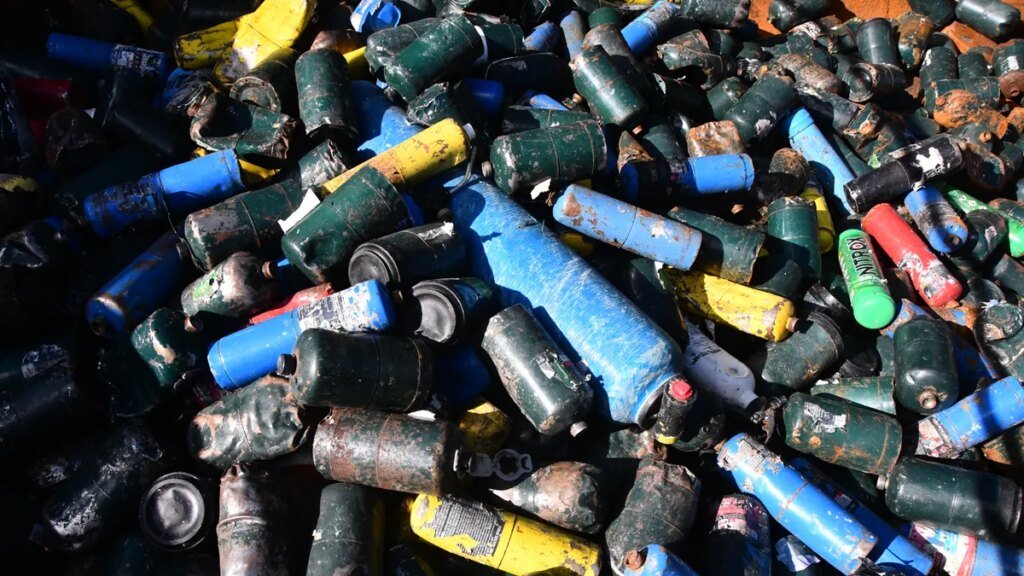Here’s what you should and should not put in your recycling cart in Brevard
WM Recycling Brevard spokesperson Amy Boyson provides quick recycling tips for Brevard County households.
- About 20% of items sent to the WM Recycling Brevard facility are non-recyclable on-site and considered contaminated.
- Improperly recycled items, like scrap metal, can cause significant damage to recycling plant equipment.
- Residents are urged to only recycle approved items like plastic bottles, cardboard, cans, glass, and paper in their single-stream bins.
Topping 10 feet tall, a mini-mountain of thousands of scrap-metal junk items attracts black flies outside the WM Recycling Brevard building — a malodorous monument to misguided residential recycling habits.
“That’s about a week’s worth right there,” Plant Manager Tim Van Ness said, standing alongside the unsightly scrap metal heap.
“You’re going to see pots and pans. You’re going to see barbecue grills. You’re going to see walkers. I mean, you’ve got a weed whacker in there,” he said.
“Non-recyclable in a single-stream facility,” added Amy Boyson, a WM spokesperson.
The WM Recycling Brevard facility in Cocoa should process about 100,000 tons of recyclables this year from customers in Brevard and Orange counties. Unfortunately, about 20% of incoming recyclables cannot be recycled by the plant’s automated equipment — or are just plain garbage.
Boyson said Brevard households generally fall into three categories:
- Expert recyclers who know and follow the regulations.
- “Wishcyclers” who want to do the right thing, but clutter their carts with junk that the single-stream plant does not process.
- People who don’t care and view their yellow-lidded recycling cart as an extra trash container.
Van Ness said residents who have a lawnmower blade or a piece of scrap metal lying around a garage may be tempted to toss it into their recycling cart because metal is recyclable.
“But if you throw it into my facility, and it comes down one of my rubber belts and gets caught somewhere? One lawnmower blade can do $10,000 worth of damage in 30 seconds in my plant,” Van Ness said.
“What’s interesting is, if they took that to a metal recycler, they would actually get paid for it. They would actually get money for it. But the homeowner throws it into their single-stream bin and it comes here — and it’s contamination,” he said.
Brevard recycling cart do’s and don’ts
WM Recycling Brevard accepts these items — which must be loose and placed directly inside yellow-lidded carts, not bagged:
- Plastic bottles and containers (clean and empty) shaped like bottles, jugs and tubs. These include beverage bottles, food containers, dish soap, laundry detergent and shampoo.
- Flattened cardboard and paper. Items range from newspapers, magazines, catalogs, office paper and junk mail to milk and juice cartons, paper towel and toilet tissue rolls, and food boxes.
- Aluminum, steel and tin cans.
- Glass bottles and containers.
Boyson said plastic bags do not belong in recycling carts: “We don’t have a buyer for them, and they get caught up in our equipment.”
Neither do food or liquids, nor foam cups or foam containers. Also, do not try to recycle rechargeable batteries, thin plastic “clamshell” packaging such as strawberry or blueberry containers, scrap metal, electronics or appliances, bedding and rugs, extension cords, clothing, hangers, Christmas lights, tires, concrete, wood or yard waste.
“It’s not that it’s not recyclable. It’s not recyclable in a single-stream facility. And that is the message that we’re still trying to stress,” Boyson said.
For more information, consult Brevard County Solid Waste’s expansive online “recyclopedia.”
Keep propane, helium tanks out of recycling carts
A new problematic product at the recycling plant: 1-pound propane fuel tanks used for portable grills and appliances. Flammable and explosive, these hazardous cannisters should never enter a recycling cart — but roughly 1,000 enter the Cocoa plant every month, Van Ness said.
In an Oct. 15 Instagram post, Orange County officials urged residents to stop sending flammable tanks to WM Recycling Brevard: “Items like helium/oxygen/propane tanks and electronic waste pose a threat to curbside collection drivers, recycling workers, and our community.”
Workers toss propane tanks into a large blue metal trash bin outside the plant. Nearby stand heaps of helium tanks from balloon-decorated parties, fire extinguishers and refrigerant tanks. These items should be taken to scrap metal facilities, not single-stream recycling carts.
“We are at the mercy of what people throw into their bin,” Van Ness said.
Rick Neale is a Space Reporter at FLORIDA TODAY. Contact Neale at Rneale@floridatoday.com. Twitter/X: @RickNeale1

